The 40,000-capacity Terrorism Confinement Center was inaugurated as President Nayib Bukele's crackdown on criminal gangs has caused the prison population to soar.
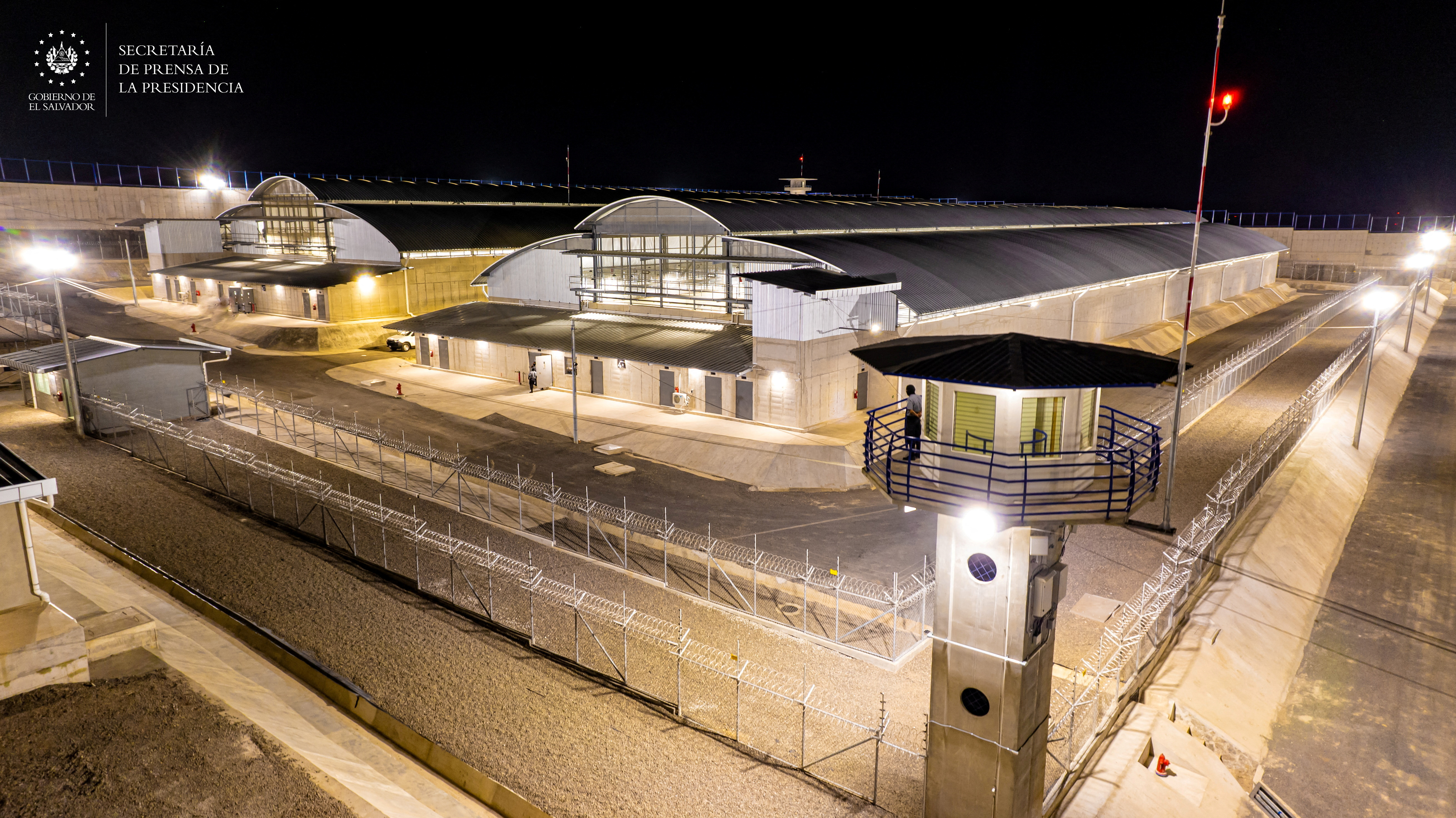
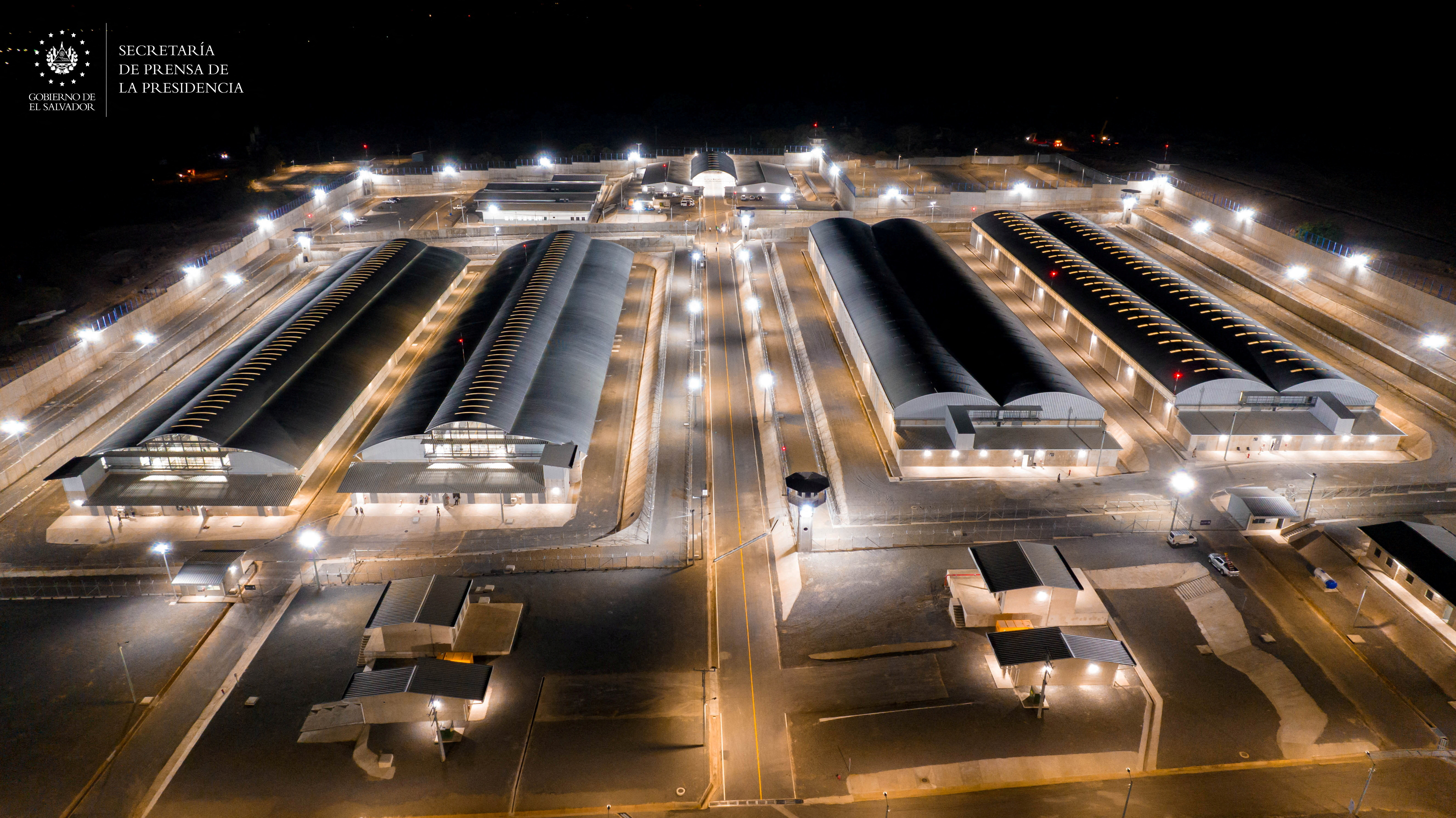
A general view shows the Terrorism Confinement Center in Tecoluca, El Salvador in a handout distributed to Reuters on February 1, 2023. Secretaria de Prensa de la Presidencia/Handout via REUTERS
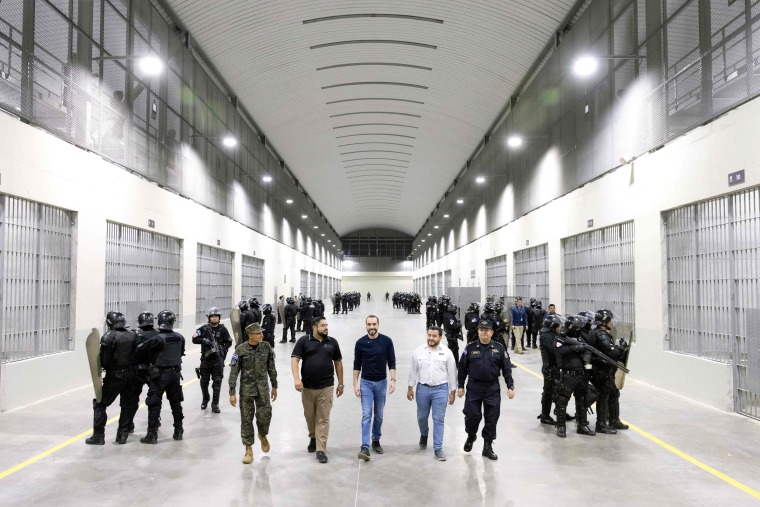
Feb. 2, 2023,
By Reuters
SAN SALVADOR, El Salvador — Authorities in El Salvador have opened one of Latin America’s largest prisons, more than doubling the country’s incarceration capacity, as a government crackdown on criminal gangs is causing the prison population to soar.
The 40,000-capacity Terrorism Confinement Center was inaugurated on Tuesday to help relieve some of the overpopulation in the country’s prison system.
Since President Nayib Bukele asked the country’s congress to approve a state of exception in March, the police and army have arrested more than 62,000 suspected gang members and their collaborators.
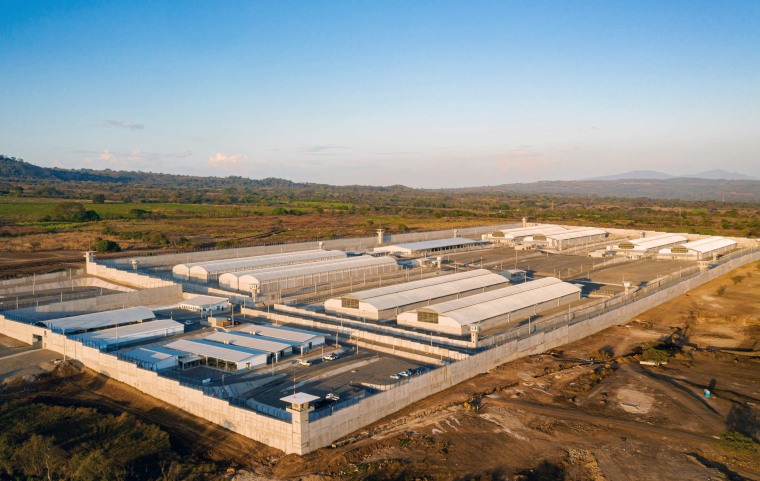
Under the measure some constitutional rights have been suspended, including allowing authorities to make arrests without a warrant and giving the government access to citizens’ communication.
With nearly two percent of its adult population behind bars, El Salvador has the highest incarceration rate in the world.
The rising inmate population as a result of the anti-gang measures, which the vast majority of the population supports, has stretched the country’s already overwhelmed prison system. El Salvador’s largest prison, La Esperanza, currently holds 33,000 people despite having a capacity of 10,000.
Recommended
El Salvador’s Prisons Director Osiris Luna said the new prison will span over 410 acres, while 600 troops and 250 police officers will secure it.
“All those home boys, those terrorists in the organization that made our beloved Salvadoran people suffer, will be house and subjected to a severe regimen,” Luna said on state television.
By 2021, El Salvador’s prison system had 20 penal centers with a capacity for 30,000 holding 35,976 prisoners.
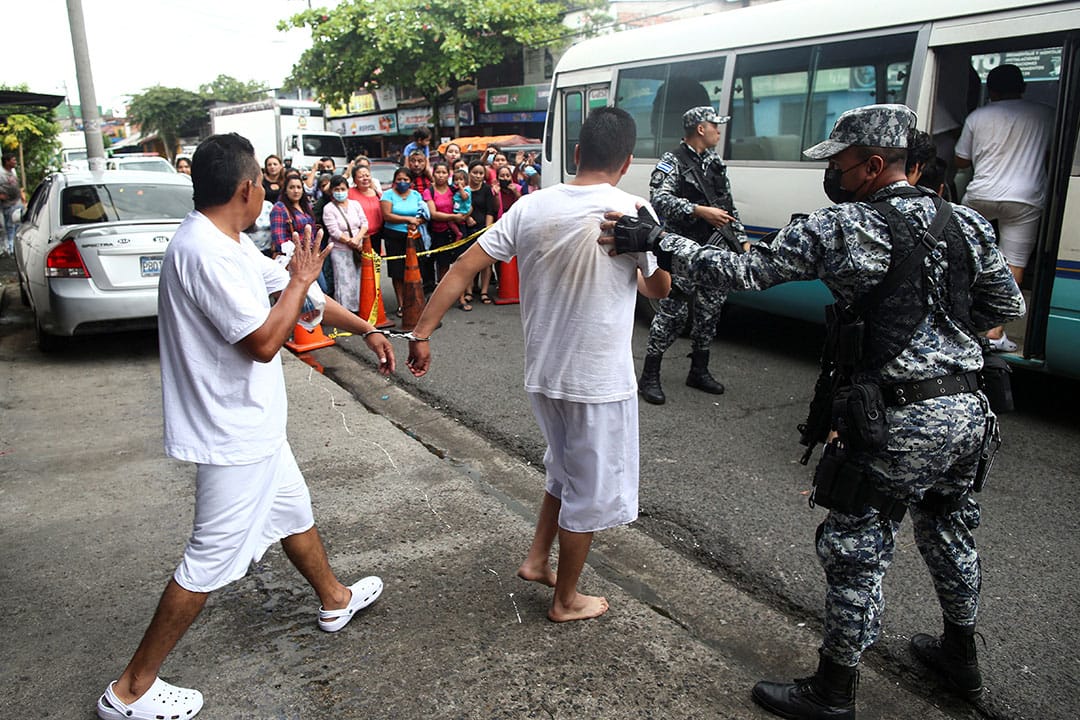
Detainees are moved to a prison by police officers as more than 37,000 people were detained during the state of emergency, according to the Ministry of Justice and Public Security, in San Salvador, El Salvador, June 7, 2022. REUTERS / Jose Cabezas
Following a spate of murders, the Salvadoran government ordered mass roundups of suspected criminal gang members, throwing more than 53,000 in jail. The clampdown is popular but unsustainable. Authorities should develop a path out of gang life that members can choose.
EL SALVADOR
What’s new? A sudden uptick of violence in March, caused by the breakdown of talks between the government and criminal gangs, has sparked a ruthless six-month law enforcement campaign in El Salvador, anchored in unprecedented mass arrests and restriction of legal rights.
Why does it matter? Fed up with gang violence, most Salvadorans have applauded the crackdown. But it has also drawn criticism from human rights organisations and could boomerang. Having more than doubled the prison population, the country is headed for a humanitarian crisis in its jails, while gangs, though now in disarray, could strike back.
What should be done? Rather than commit to strong-arm tactics for the long term, the government should provide an off-ramp for the thousands of gang members willing to build new lives in law-abiding society. The country’s main foreign partners should support these efforts and revive their cooperation with San Salvador.
Executive Summary
To a chorus of popular support, El Salvador’s President Nayib Bukele has embarked on the largest dragnet of suspected gang members ever seen in Central America. Under a “state of exception” declared in March, the government has lengthened the period of detention without charge and lowered the age of prosecution to twelve. Police and troops have mounted checkpoints around and raids on poor districts overrun by gangs. Some 53,000 alleged criminals have been jailed on the basis of often dubious proof, many in overcrowded, unhygienic and dangerous conditions. The prison population now stands proportionally as the world’s highest, prompting authorities to break ground for a massive new facility. But although murder rates are touching new lows, with many gang members either jailed or on the run, the draconian policy raises other concerns that require attention. Gangs could regroup to retaliate while a humanitarian and human rights crisis festers in the country’s jails. For the country’s long-term benefit, authorities should develop a way for gang members to return to society as law-abiding citizens.
The crackdown’s severity is all the more startling in light of Bukele’s reported overtures to the criminal gangs that have tormented El Salvador for over two decades. Elected in 2019 as an outsider intent on supplanting a discredited two-party system, the extroverted young president boosted public services in places plagued by poverty and violence, where gangs find many of their recruits. According to media reports and first-hand testimony gathered by Crisis Group, his government also entered discreet talks with jailed and free gang leaders, spurring a steep reduction in homicide rates. In return, the authorities reportedly granted these leaders a number of concessions, including expedited release for some of them. During this period, the police and military reported fewer clashes with gangs and arrests of their members.
A shocking killing spree late in March, including the murder of 62 people on one day – the bloodiest 24 hours in recent Salvadoran history – provided the backdrop for Bukele’s abrupt change of tack. Yet even before this flare-up, there were reasons to doubt the government’s commitment to a negotiated demobilisation of gangs. The president has always denied that talks with gangs were happening, suggesting that negotiation was unlikely to be a pathway to a permanent settlement. As soon as his party won an absolute majority of seats in the legislature in 2021 elections, he worked with deputies to bury any evidence of talks by replacing the attorney general and shelving his predecessor’s investigation into the reported negotiations. The MS-13 gang has suggested it carried out the March killings because it felt betrayed by the government’s disavowal of the previous engagement, hinting that the president’s interest even in secretive talks had waned by then.
Bukele’s government has turned to heavy-handed tactics to respond to surges of gang violence in the past, but none compares to the present crackdown.
Bukele’s government has turned to heavy-handed tactics to respond to surges of gang violence in the past, but none compares to the present crackdown in either intensity or duration. With public support for the state of exception sky-high, Bukele seems convinced he is sounding the death knell for the country’s three main gangs. He fiercely rejects criticism of his methods.
But there are grounds for wondering whether Bukele will succeed. Although murder rates have reached historical lows, clashes between gangs and security personnel are on the rise. Gangs have leaked statements threatening to hit back harder if the government does not return to dialogue. The campaign to arrest anyone who has, has had or may have had a link with gangs could force former members back into crime if they see no hope of anything else. Mass arrests of former gang members who have converted to Christianity in order to quit gang life are troubling. Dire overcrowding, combined with the government’s refusal to take responsibility for what has gone wrong – from custodial deaths to wrongful arrests – could fuel tensions in jails, leading to mutinies and escapes. El Salvador’s experience in 2015 after its gang truce broke down, when the murder rate rose to the world’s highest, hints at the risks that may lie ahead. Adverse financial conditions, the threat of debt default and strained ties with the West make it all the more vital that Bukele shift to a security policy that is resilient, durable and internationally reputable.
El Salvador needs a more humane and sustainable approach to solving its gang problem. A crucial plank of such a policy would be the creation of a clear pathway out of gang life for jailed and free members. Even as they seek to profit politically from fighting crime, Bukele and his senior officials should be mindful of the innate dangers of a huge prison population, which must be fed and housed, and begin looking for ways to release jailed suspects and convicts subject to their monitored participation in rehabilitation programs. Various bills to create a national rehabilitation scheme have been tabled in the country’s Legislative Assembly over recent years, but none has prospered; these should be revived. A rehabilitation and reintegration initiative should include measures that promote employment for former gang members, with support from churches and civil society. To help communities accept the gang members who may come to live among them, San Salvador should also promote restorative justice for victims of violence. Support from large donors, including the U.S. and European Union, will likely be key to making this initiative a reality.
Bukele has so far shown little interest in slowing his pursuit of gangs’ unconditional surrender. But the humanitarian and reputational costs as well as the risks of a return to extremes of lethal violence make it imperative that the government prepare an alternative way out for the jailed population. Force may put the gangs on the run for a period of time, but it will take much more to begin dismantling them for good.
Mass Incarceration: The Whole Pie
2022 | Prison Policy Initiative
Can it really be true that most people in jail are legally innocent? How much of mass incarceration is a result of the war on drugs, or the profit motives of private prisons? How has the COVID-19 pandemic changed decisions about how people are punished when they break the law? These essential questions are harder to answer than you might expect. The various government agencies involved in the criminal legal system collect a lot of data, but very little is designed to help policymakers or the public understand what’s going on. As public support for criminal justice reform continues to build — and as the pandemic raises the stakes higher — it’s more important than ever that we get the facts straight and understand the big picture.
Further complicating matters is the fact that the U.S. doesn’t have one “criminal justice system;” instead, we have thousands of federal, state, local, and tribal systems. Together, these systems hold almost 2 million people in 1,566 state prisons, 102 federal prisons, 2,850 local jails, 1,510 juvenile correctional facilities, 186 immigration detention facilities, and 82 Indian country jails, as well as in military prisons, civil commitment centers, state psychiatric hospitals, and prisons in the U.S. territories.
This report offers some much-needed clarity by piecing together the data about this country’s disparate systems of confinement. It provides a detailed look at where and why people are locked up in the U.S., and dispels some modern myths to focus attention on the real drivers of mass incarceration and overlooked issues that call for reform.
No comments:
Post a Comment